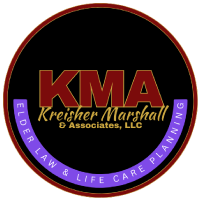Proactive Medicaid Planning For Pennsylvania Seniors
Financing a nursing home stay is no small feat. While it’s important to make sure that you have quality long-term care should you need it, that care is expensive. It’s hard to think about your entire life savings getting eaten up by long-term care.
Planning ahead to ensure eligibility for government benefits to cover long-term care is not easy, but it can be done. At Kreisher Marshall & Associates, LLC, our elder law attorneys have been helping aging residents in Bloomsburg and its surrounding communities since 1971. With certified elder law attorneys, our legal team can help accurately assess your situation and advise you on the best options that are available to you and your family.
Our lawyers are available for initial consultation appointments. You can reach us by calling 570-798-1084 or sending us an email.
What Is Medicaid And How Can You Qualify?
Medicaid, also known as Medical Assistance, provides assistance for paying the costs of long-term nursing home stays. It is available for both individuals and married couples. There are many requirements the applicant must meet before being deemed eligible for Medicaid benefits – including income and asset limitations. Depending upon the gross income, an applicant is permitted to retain $2,400 or $8,000 of countable assets. However, not all assets are “countable” assets. For instance, in most circumstances, the primary residence does not count as an asset.
There are also laws and regulations in place to protect the community spouse by ensuring that they have sufficient assets and income to maintain their lifestyle. If you and/or your spouse’s assets are over the limit, those extra resources must be “spend down”. However, that “spend-down” is not limited to paying for the nursing home.
In addition, there is a five-year look back through all of your assets to see if any gifting was done for the purposes of obtaining Medicaid eligibility. If you have gifted in the past five years, the state tallies the total amount gifted during that time and imposes a penalty by taking the total amount gifted divided by the average daily rate for a nursing home in Pennsylvania (as of 1/1/20 this rate is $423.11/day). There are ways to pay the nursing home during this penalty period.
How Is Medicare Different Than Medicaid?
Medicare may provide some payments for a short-term stay in a nursing home as long as the institutionalized individual meets certain requirements. Generally, even if those requirements are met, Medicare will only pick up the full bill for the first 20 days. From days 21 to 100, there is a co-pay each day. Depending on the supplemental insurance, if any, this co-pay may be reduced or even eliminated.
After day 100, Medicare will not pay anything toward a stay in the nursing home. At this point, the patient would be deemed to need long-term care. Medicare does not pay for long-term care. At a monthly cost of $10,000-$12,000, it doesn’t take long for savings to dwindle. This very quickly leaves a family wondering how to pay for the care and how to make sure that the spouse at home has enough money to maintain their lifestyle.
However, when your estate plan includes a strategy for long-term nursing home care, this scenario does not have to bring added stress because you’ll know that you’ve already done the work to protect your assets and prepare for this. Our elder law attorneys know that this can be confusing and you might have a lot of questions. They make sure that they are available to their clients to answer their questions and put their worries to rest.
If You Are In A Nursing Home, You Can Still Plan
There is a common misconception that once an individual enters a nursing home, there is nothing you can do to plan to protect your assets. However, there are several crisis planning techniques that can be utilized to save assets even after an individual has entered a nursing home. It is important to begin this process as soon as possible after admission to the nursing home to take full advantage of the laws in place for protecting the most assets, whether it be for the spouse at home or your children.
Speak With A Medicaid Planning Lawyer About Your Options
Our office is located in the heart of Bloomsburg, Pennsylvania. Call us today at 570-798-1084 or send us an email to set up your initial consultation. You can also schedule a quick 15-30 minute phone call with one of our experienced staff to discuss your various questions and concerns and they can schedule you an emergency appointment with one of our certified elder law attorneys.


